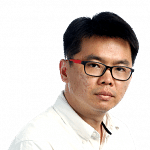BEIJING - Singapore, as a small city-state, cannot survive in a world where might is right, which is why it needs to be a strong advocate of a rules-based world order, Singapore's Senior Minister of State for Defence Ong Ye Kung told regional security and defence personnel at a dialogue here on Tuesday morning (Oct 11).
That was why when Singapore became independent in 1965, the Separation Agreement guaranteed the Republic's Water Agreements with Malaysia, he added.
"A small country needs a world order that respects and abides by international law and the sanctity of contracts and agreements. We cannot over-rely on history because it was not too long ago in history that Singapore did not exist," said Mr Ong at the Xiangshan Forum. The event is seen as China's version of the Shangri-La Dialogue held yearly in Singapore.
Speaking in a plenary session on responding to new security challenges in the Asia-Pacific through cooperation, Mr Ong added that this is why Singaporean diplomats have played an active role in the setting up of international conventions like the United Nations Convention on the Law of the Sea, multilateral trading regimes, and climate change negotiations that led to the emissions-cutting Paris Accord last December.
But upholding a rules-based international order, along with that of an open and inclusive regional architecture, does not benefit only small countries like Singapore but can also act as underlying bases and principles for all countries, big and small, to co-exist and prosper in the era of globalisation, he added.
Referring to Chinese Premier Li Keqiang's comments at the World Economic Forum in Davos last year that countries should seek to expand common ground amid differences and win-win cooperation through inclusive cooperation, Mr Ong said such a world system needs clear and established norms and rules of behaviour.
"Even when issues are complex and differences are significant, we can start by respecting and setting aside differences, while codifying rules and commonalities that all can agree to," he added, pointing out that militaries can also play a part by holding joint exercises, sharing views and keeping communications open.
The Xiangshan Forum is jointly organised by the Chinese Academy of Military Science, a research institution within the People's Liberation Army (PLA), and the China International Strategic Society, a think-tank.
First held in 2006 on a biennial basis, the forum became a yearly affair and was upgraded in 2014 from an academic exchange to a ministerial-level dialogue with regional defence chiefs invited to join.
The move was seen as China's bid to improve interactions with regional defence and security personnel and to ensure its voice on security issues would be heard accurately.
Some 400 delegates from 59 countries and six international organisations this year are attending the forum, which is named after its regular venue in the Xiangshan resort area in western Beijing.
Chinese Defence Minister Chang Wanquan, a member of the Central Military Commission (CMC) that controls the PLA, also gave a keynote address on Tuesday at the forum's official opening.
Among the key issues expected to dominate discussions at the three-day event are the South China Sea territorial disputes between China, the Philippines, Vietnam, Malaysia, Brunei and Taiwan, and also the need for stronger global efforts to tackle transnational security challenges such as terrorism and climate change.


